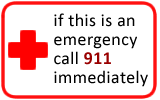STD - Genital Herpes
STD - Genital Herpes
Does this describe your symptoms? |
Definition
General Information
Typical Symptoms of Genital Herpes
Additional Resources
|
If not, see these topics
|
When to Call Your Doctor |
Call Your Doctor Now (night or day) If |
|
|
|
Call Your Doctor Within 24 Hours (between 9 am and 4 pm) If |
|
|
|
Call Your Doctor During Weekday Office Hours If |
|
|
|
Self Care at Home If |
|
|
HOME CARE ADVICE FOR GENITAL HERPES |
How is genital herpes transmitted?
Genital herpes is spread by sexual intercourse (vaginal or anal) or any direct contact with the genitals of a person who has an active herpes infection (initial episode or recurrence).
Many people do not know that they have genital herpes. A person can have no symptoms and still transmit the virus. As a result, most cases of transmission occur with neither sexual partners knowing that it is occurring.
Oral herpes (fever blisters) also can be spread to the partner's genitals during oral sex.
How long does it usually take for symptoms to appear once one is exposed?
The incubation period is 2 days to 2 weeks.
How can I get tested for herpes?
Genital herpes can be diagnosed with a specimen taken from a blister or by blood testing.
Is there treatment for genital herpes?
First episode - There are antiviral medications that can be used for genital herpes. Medication doesn't cure the disease, but can shorten the duration of symptoms. Speak with your physician.
Recurrent episodes - Antiviral medications can reduce and shorten the duration of symptoms. Speak with your physician.
I have genital herpes. How can I protect my sexual partner from getting herpes?
Inform your sexual partner that you have herpes.
Abstain from sexual activity with uninfected sexual partners whenever you have the herpes sores or feel them coming on.
Remember that you can transmit herpes even when you have no symptoms.
A latex condom can reduce the chance of transmission, if used correctly and if the condom covers the herpes sores.
STD National Hotline
The CDC National STD Hotline provides information on sexually transmitted diseases (STDs), such as chlamydia, gonorrhea, HPV/genital warts, herpes, and HIV/AIDS. Specialists can provide general information, referrals to local clinics, and written materials about STDs and disease prevention.
Toll-free number (English): (800) 227-8922
Toll-free number (Spanish): (800) 344-7432
Their website is at: http://www.ashastd.org
Pregnancy test, when in doubt:
If there is any possibility of pregnancy, obtain and use a urine pregnancy test from the local drug store.
Follow the instructions included in the package.
Call Your Doctor If:
Pregnancy test is positive or if you have difficulties with the home pregnancy test.
Discharge from penis or unusual vaginal discharge
You become worse
And remember, contact your doctor if you develop any of the "Call Your Doctor" symptoms.
Updated:
March 22, 2017



